(This post is also written in English) Llegó la rotación que llevaba esperando cinco años.
Nos recibieron diciéndonos que no hacíamos ni lo más mínimo para cuidar nuestra piel, aún no habíamos entrado al aula, estábamos en la entrada del hospital y ya nos estaban regañando.
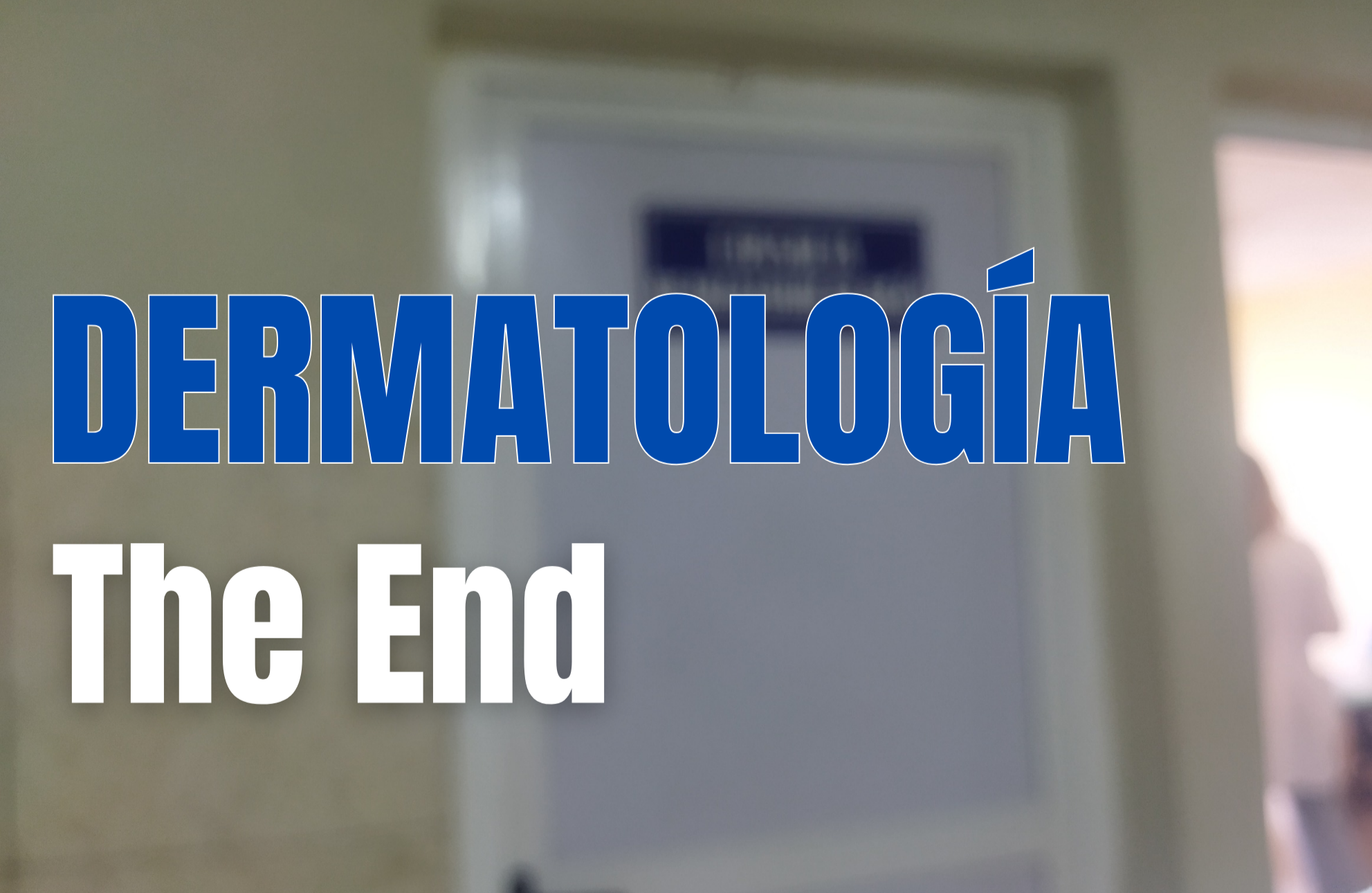
Luego de tres semanas, me di cuenta de que es cierto ... nunca es suficiente los cuidados que le podamos dar a la piel.
No importa si eres hombre o mujer, debes cuidar más tu piel.
Ese no es el tema del artículo, como cada rotación terminada; te cuento como me fue, así te llevas una idea de como es estudiar medicina en Cuba.
Empecemos
Llegaba a esta rotación con la emoción de ser la última de quinto año y la última de la carrera, porque en sexto año tienes más responsabilidad médica que estudiantil.
Te podrás imaginar todo lo que significa Dermatología para un estudiante que vio sus estudios detenidos por pandemia, que ha visto como su tiempo de formación se ha acortado y apretujado para mantener un calendario que no deja de ser relativo. En fin, era el final de mucho.
Por experiencia de otros compañeros ya sabíamos que nos enfrentaríamos a una de las rotaciones más difíciles del año. Muchas cosas absurdas pasarían en solo tres semanas.
ENGLISH
The rotation I had been waiting for five years has finally arrived.
They welcomed us by telling us that we weren’t doing even the bare minimum to take care of our skin. We hadn’t even entered the classroom yet; we were at the hospital entrance, and they were already scolding us.
After three weeks, I realized it was true: we can never do enough to care for our skin.
It doesn’t matter if you’re a man or a woman; you need to take better care of your skin.
That’s not the main topic of the article; as with every completed rotation, I’ll tell you how it went so you can get an idea of what it’s like to study medicine in Cuba.
Let’s begin.
I approached this rotation excited because it was the last one of my fifth year and the final rotation of my degree. In the sixth year, you have more medical responsibilities than student ones.
You can imagine what Dermatology means for a student whose studies were interrupted by the pandemic, who has seen their training time shortened and squeezed to maintain a schedule that remains relative. In short, it was the end of much.
From the experience of other classmates, we already knew we would face one of the most difficult rotations of the year. Many absurd things would happen in just three weeks.
Evolución Médica sin sentido
En las mañanas debíamos subir a la sala de Dermatología, la cual solo contaba con dos pacientes (durante toda la rotación) Cada alumno debía hacer una evolución de como veía la lesión de la paciente.
17 alumnos por paciente. Como podrás imaginar, todas las evoluciones terminaban siendo muy parecidas. La profesora no paraba de quejarse y molestarse con eso, pero que podía hacer. ¡17 alumnos para una paciente!
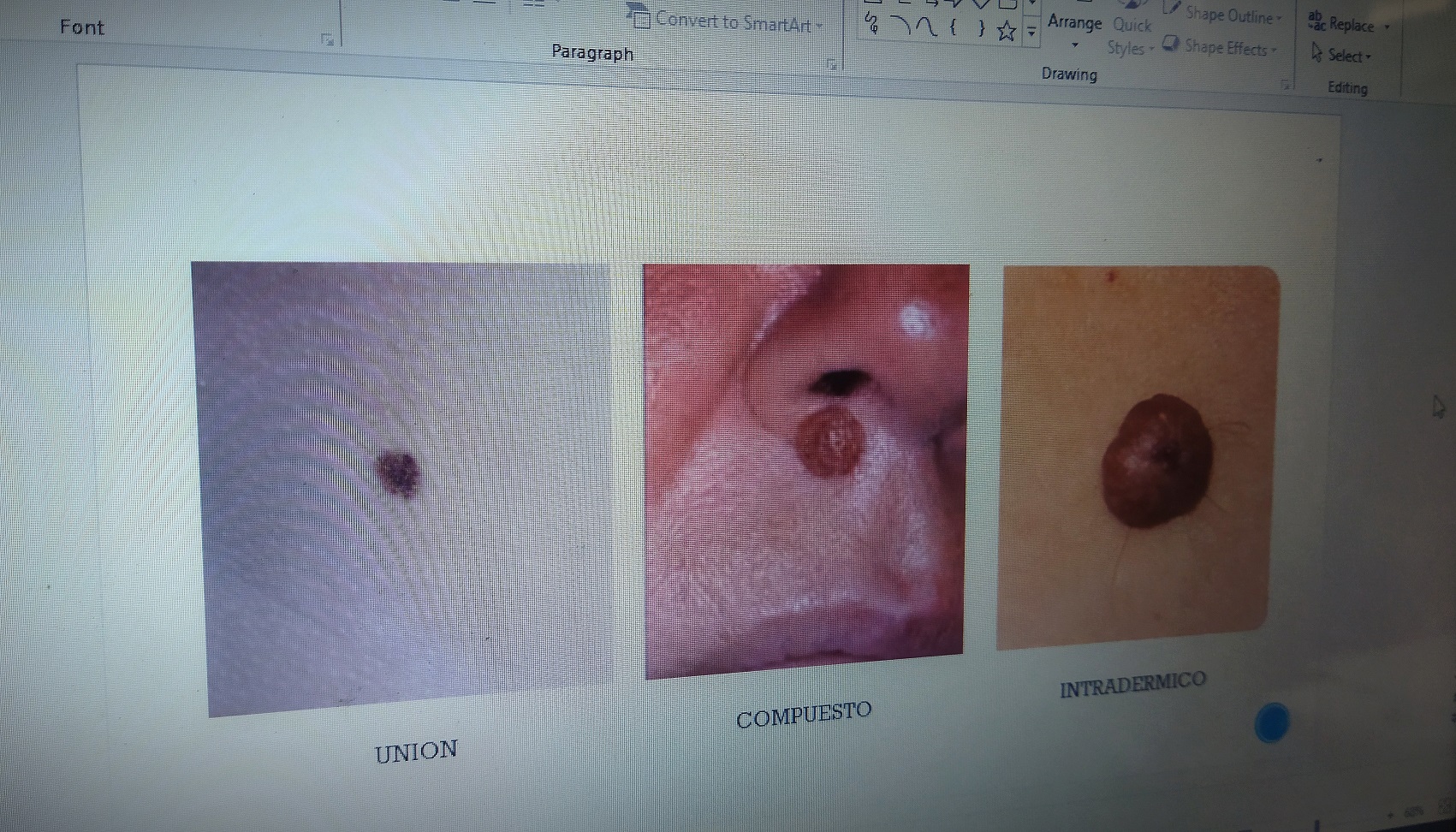
¿Sabes qué hacían con esas evoluciones? Pues eran las hojas que se usan para las preguntas escritas. Se reciclaban.
Tal vez a mi hermana le toque evaluarse en una de mis evoluciones dentro de unos meses . Cosas que solo se ven en Cuba
Pero esto solo ha empezado ...
Meaningless Medical Evaluations
In the mornings, we had to go up to the Dermatology ward, which only had two patients (throughout the entire rotation). Each student had to make an evaluation of how they saw the patient’s lesion.
Seventeen students per patient. As you can imagine, all the evaluations ended up being very similar. The professor wouldn’t stop complaining and getting upset about it, but what could she do? Seventeen students for one patient.
Do you know what they did with those evaluations? They were the sheets used for written questions. They were recycled.
Maybe my sister will have to be evaluated on one of my assessments in a few months. Things you only see in Cuba.
But this has only just begun...
Dermatología bajo agua
Durante mi segunda semana una depresión tropical se acercó al Occidente de Cuba, trayendo unas lluvias demenciales, inundando e incomunicando varias zonas de la ciudad.
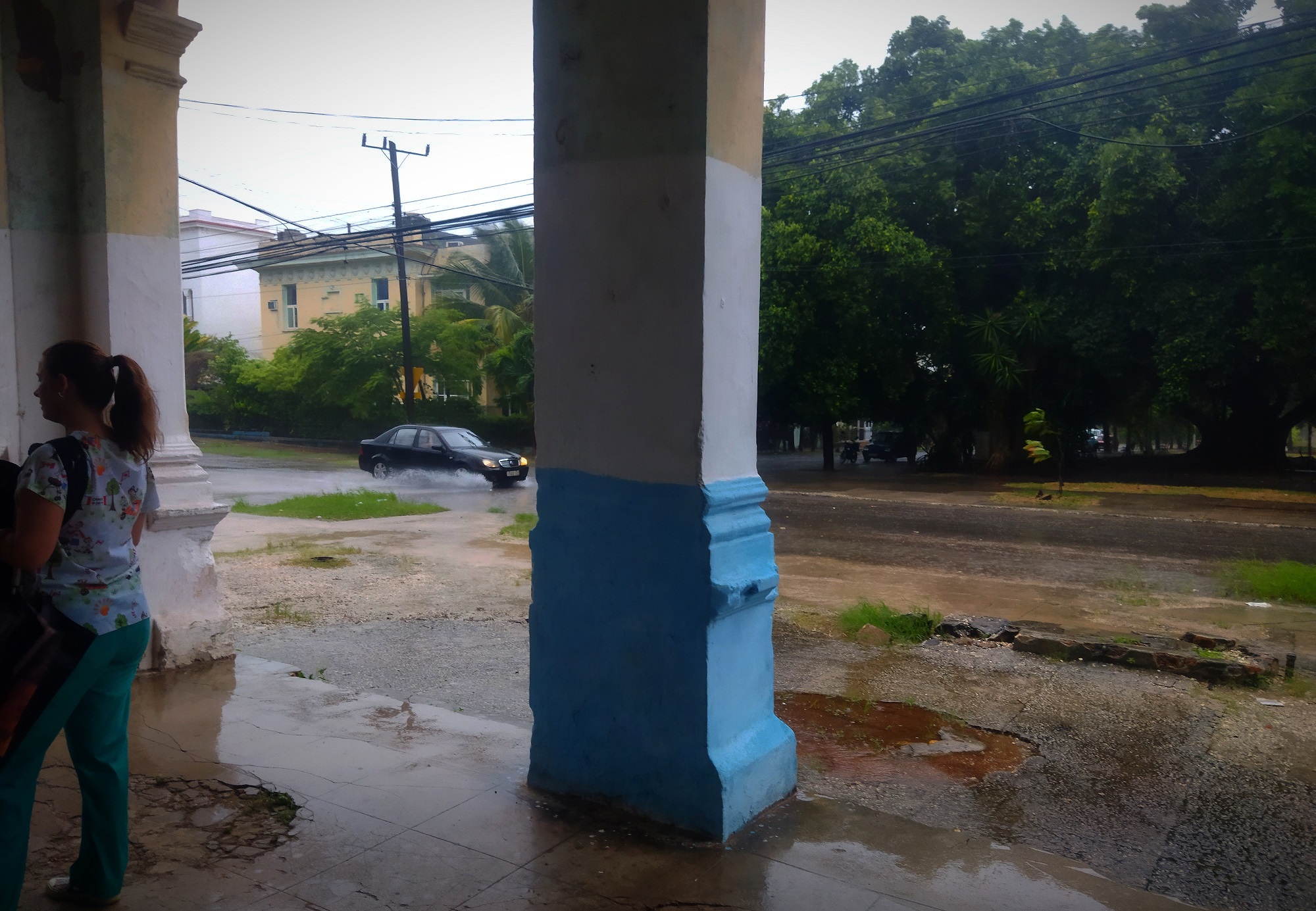
En Dermatología nos hicieron ir al hospital, porque el proceso docente no podía detenerse. Bajo una lluvia que no dejaba ver a tres metros, llegué al hospital ( una ausencia representaba perder una nota, que podía afectar el acumulado )
Todo mojado, con 4 estudiantes y sin corriente, se dio uno de los temas más importante de la asignatura. ¿Era justo? ¿Era necesario?
¡Según la profesora, sí! Lo peor es que el segundo día de lluvias, los profesores no vinieron porque vivían lejos, pero los estudiantes se suponían que debían llegar. Una falta de respeto hacia el alumnado.
Y cuando pensaba que no se podían superar era el turno del examen práctico.
Dermatology Underwater
During my second week, a tropical depression approached the western part of Cuba, bringing torrential rains that flooded and isolated several areas of the city.
In Dermatology, we were told to go to the hospital because the teaching process couldn’t stop. Under rain that made it impossible to see three meters ahead, I arrived at the hospital (since missing a class meant losing a grade, which could affect my overall score).
Soaked, with four students and no electricity, we tackled one of the most important topics of the subject. Was it fair? Was it necessary?
According to the professor, it was. The worst part was that on the second day of rain, the professors didn’t come because they lived far away, but the students were expected to be there! It was a disrespect to the students.
And just when I thought things couldn’t get worse, it was time for the practical exam.
Examen Práctico
Íbamos avisados que era bastante peculiar. Pero no fue hasta que se evaluó el primero, que lo descubrimos a ciencia cierta.
La profesora tomaba su teléfono y desplazaba el dedo hasta donde diera el teléfono o ella lo parase. Luego te mostraba la foto y debías decirle que tipo de lesión y posible diagnóstico tenía el paciente.
En dermatología todas las lesiones se parecen o son familia. Lo único que las diferencia ( i más o menos /i )es el nivel sobre la piel. En una foto, es casi imposible determinar si tiene relieve.
Hubo compañeros míos que le salieron lesiones que aparecen en 1 de cada mil paciente. Imagínate diagnosticar eso por una foto. En solo tres semanas de rotación.
Por suerte, para mí, me salió las lesiones de la Escabiosis y en Cuerpo de Guardia las he visto bastante.
El examen teórico sí fue bastante sencillo, pero para hacerlo debías aprobar el práctico, algunos de mis compañeros no lo lograron.
Practical Exam
We had been warned that it was quite peculiar. But it wasn’t until the first student was evaluated that we truly understood it.
The professor would take her phone and scroll until it stopped. Then she would show you the photo, and you had to tell her what type of lesion and possible diagnosis the patient had.
In dermatology, all lesions look similar or are related. The only difference is the level above the skin. In a photo, it’s almost impossible to determine if there’s any elevation.
Some of my classmates had lesions that appear in one out of every thousand patients. Imagine diagnosing that from a photo in just three weeks of rotation.
Fortunately for me, I got lesions of scabies, and I’ve seen them quite a bit in the emergency room.
The theoretical exam was pretty straightforward, but to take it, you had to pass the practical; some of my classmates didn’t manage to do so.
Consulta de Dermatología
Recuerdo que cuando roté por Urología comentaba en ese post que las consultas eran un desastre con tantos estudiantes y tan pocos pacientes. Pues dermatología es el doble de peor.
Es una especialidad de la que el gobierno cubano le saca mucho negocio y está llena de residentes colombianos. Por consulta hay unos 7 residentes, más los especialistas, más los estudiantes.
Cuando el paciente entraba y veía aquella cantidad de gente se impresionaba.
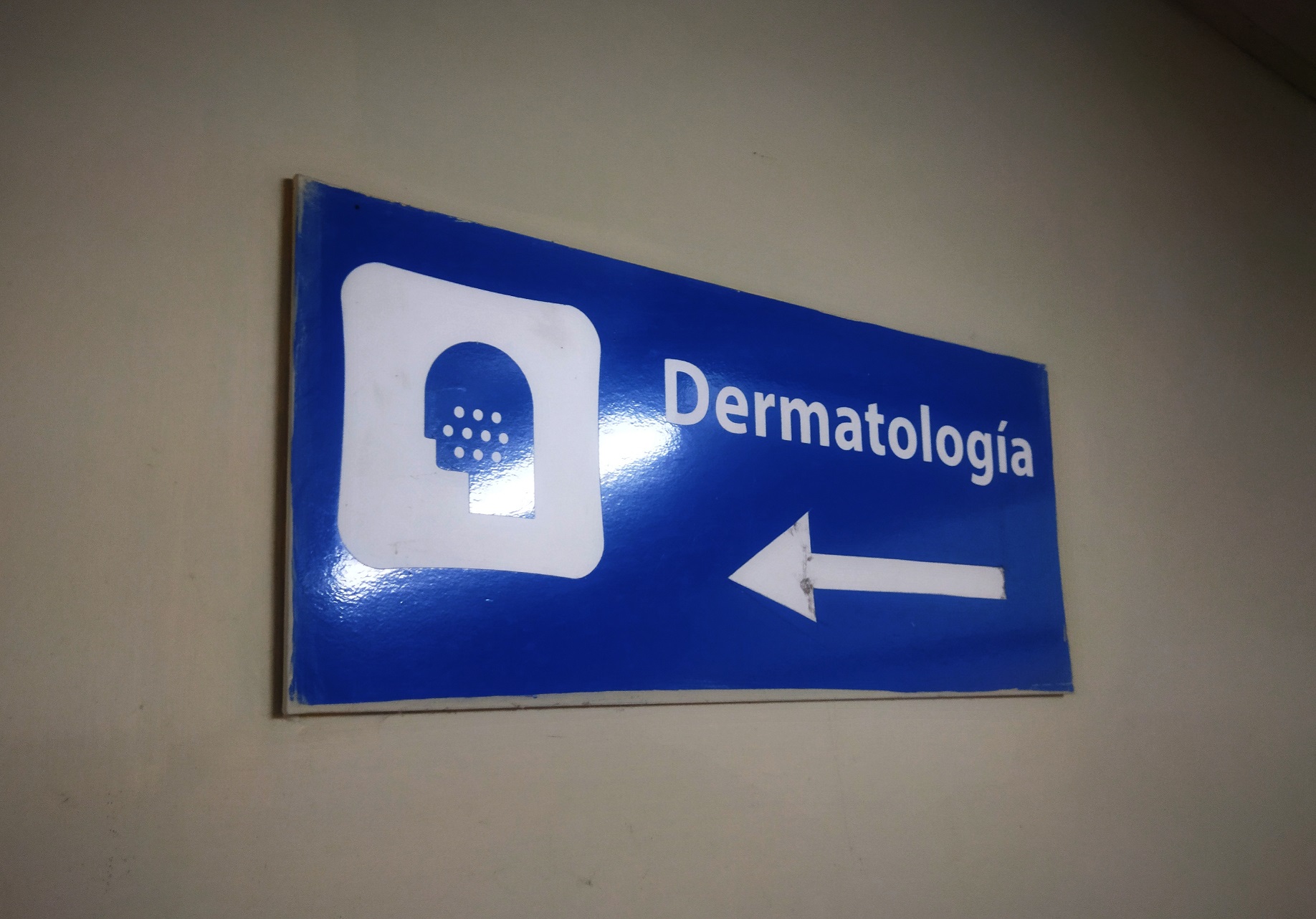
Un día me toco rotar por la consulta de enfermedades genitales; en la consulta éramos unas 11 personas (personal médico) Cuando el paciente llegaba que le decían que tenía que exponer sus genitales, era una situación muy incómoda.
Creo que aquí la avaricia del gobierno, se ha puesto por encima de la necesidad e los pacientes. Sin palabras con eso.
Dermatology Consultations
I remember when I rotated through Urology, I mentioned in that post that the consultations were a disaster with so many students and so few patients. Well, dermatology is twice as bad.
It’s a specialty that the Cuban government profits from a lot and is filled with Colombian residents. For each consultation, there are about seven residents, plus specialists and students.
When the patient entered and saw that many people, they were taken aback. One day, I had to rotate through the genital diseases consultation; there were about eleven of us (medical staff) in the room. When the patient was told they had to expose their genitals, it was a very uncomfortable situation.
I believe that here, the government’s greed has taken precedence over the patients’ needs. I’m at a loss for words about that.
Consejos
Ahora dejando de lado lo insólito, te cuento todo lo que aprendí y sobre todo lo que me llevo para autoaplicarlo.
Las lesiones de piel más comunes son por efecto del sol, en hombres son aún más común. No importa donde vivas, trata de usar bloqueador solar por encima de FPS 50 y mejor si no es graso.
No se trata de dorarte o verte más blanco, sino de evitar lesiones precanserosas. Muchos lunares se pueden convertir con facilidad en tumores (no te puedes imaginar con cuanta facilidad)
Si tu economía no te lo permite, entonces usa ropa holgada y protégete la mayor cantidad de piel posible.
Otra de las cosas sencillas que podemos hacer para mejora nuestra piel, es ELIMINAR el jabón. Cierto que hay miles de marcas y fragancias que te dejan la piel como nueva, pero aun así y desconfiando de todo el marketing, el jabón es un enemigo de la piel.
En su lugar, trata de sustituirlo por Gel, pero un gel que no sea de colores llamativos (estos tienes más químicos) y de preferencia con Ph neutro.
Por supuesto, olvídate de bañarte con agua muy caliente. Eso solo mata muchas de las células de la Epidermis y solo expone la piel a vulnerabilidades, así que evita eso.
Creo que estos son los consejos que más me llevo y como dije al principio, nunca es suficiente el cuidado de la piel. Al fin al cabo es el órgano más grande de nuestra piel y una de las primeras barreras de defensa del cuerpo
En internet hay ciento de páginas y consejos de todo tipo, así que siempre busca una fuente de información confiable (por ejemplo la Sociedad Americana de Dermatología o sus homólogos en otros países) y cuida tu piel.
La rotación no me gustó, si me aportó muchísimo a mi formación cómo médico y completó los cinco años anteriores; pero creo que se pierde mucho tiempo en cosas diminutas y detalles nada importantes y se le presta poca atención a la formación in situ .
Advice
Now, setting aside the unusual, let me share everything I learned and, above all, what I’ll apply to myself.
The most common skin lesions are caused by sun exposure, especially in men. It doesn’t matter where you live; try to use sunscreen with an SPF above 50, and preferably one that isn’t greasy.
It’s not about getting tanned or looking whiter, but about preventing precancerous lesions. Many moles can easily turn into tumors (you can’t imagine how easily).
If your budget doesn’t allow it, then wear loose clothing and protect as much skin as possible.
Another simple thing we can do to improve our skin is to ELIMINATE soap. It’s true that there are thousands of brands and scents that leave your skin feeling new, but still, and despite all the marketing, soap is an enemy of the skin.
Instead, try replacing it with gel, but make sure it’s not brightly colored (these have more chemicals) and, above all, has a neutral pH.
Of course, forget about showering with very hot water. That only kills many of the epidermal cells and exposes the skin to vulnerabilities, so avoid that.
I think these are the main tips I’m taking away, and as I said at the beginning, skin care is never sufficient. After all, it’s the largest organ of our body and one of our first lines of defense.
Of course, there are hundreds of websites and advice online, so always look for a reliable source of information, like the American Academy of Dermatology or its counterparts in other countries, and take care of your skin.
I didn’t like the rotation, but it contributed a lot to my training as a doctor and completed the previous five years; however, I think a lot of time is wasted on trivial things and unimportant details, while too little attention is paid to on-site training.
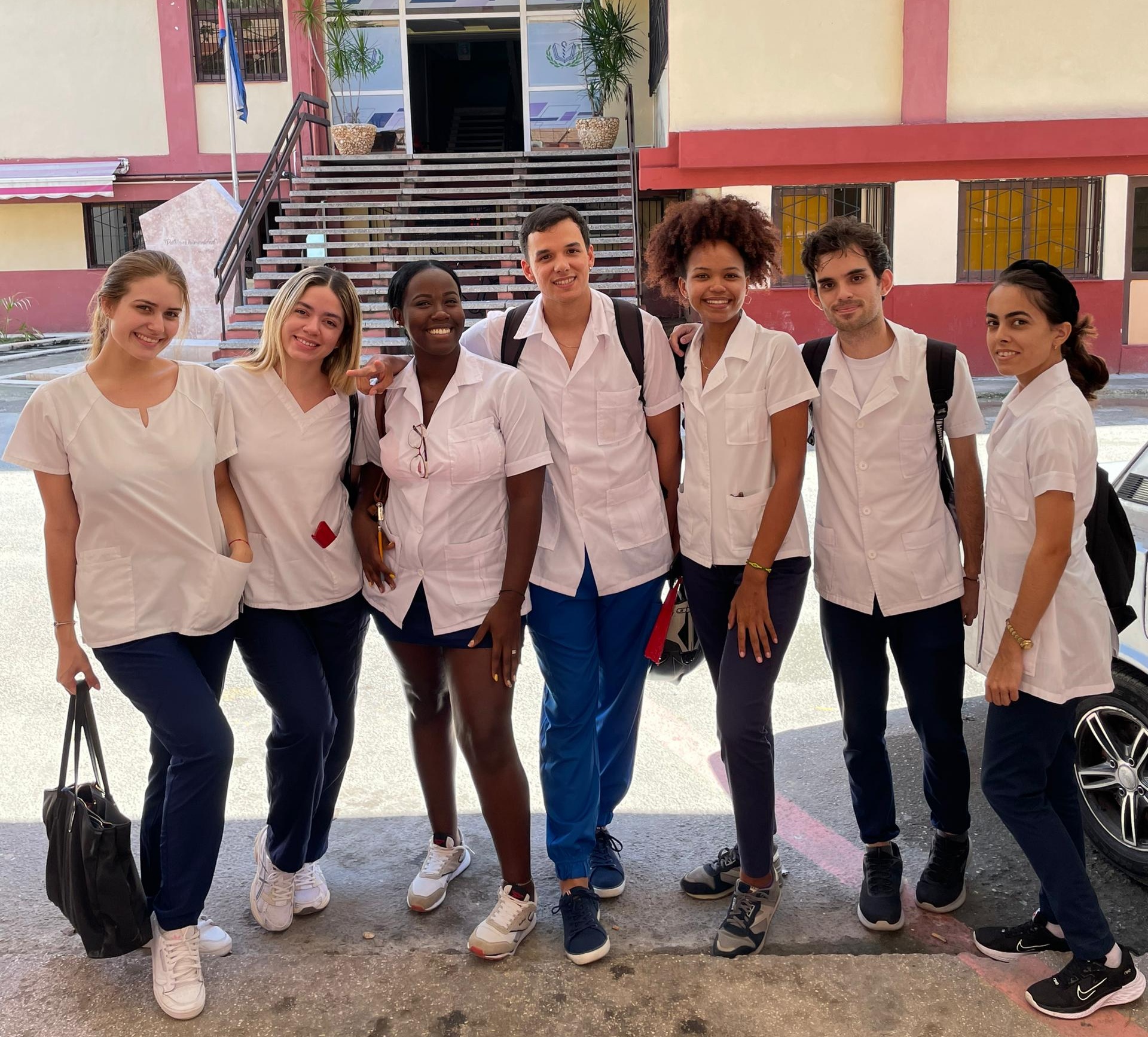
Este es el último resumen de este tipo (¡qué nostalgia!) si me has leído hasta aquí te lo agradezco muchísimo. No te preocupes, el contenido del hospital no va a parar.
El próximo paso es empezar el internado (sexto año) La educación en este año es más orientada al manejo y terapéutica de los pacientes. Como dice mi tutor ... Eres un médico sin título ni cuño, pero ya eres médico.
Si es primera vez que me lees, te invito a que me sigas para que no te pierdas nada de este último año, que tengo pensado compartirte todo lo que vaya viviendo, que en Cuba sé que no será poco.
En sexto estaré rotando por Medicina Interna (Emergencia incluida), Pediatría, Medicina Familiar (MGI), Ginecología y Obstetricia.
Las últimas tres, las tienes documentadas en mi blog, así que veremos como cambia mi experiencia ahora de interno.
Por supuesto, te vuelvo a invitar a que me sigas para que estés al tanto de todo. Nos vamos a divertir muchísimo.
ENGLISH
This is the last summary of this kind (how nostalgic). If you’ve read this far, I really appreciate it. Don’t worry, the hospital content won’t stop.
The next step is to start my internship (sixth year). Education this year is more oriented towards managing and treating patients. As my mentor says, you’re a doctor without a title or stamp, but you’re already a doctor.
If this is your first time reading me, I invite you to follow me so you don’t miss anything from this last year, as I plan to share everything I experience, which I know won’t be little in Cuba.
In sixth year, I’ll be rotating through Internal Medicine (including Emergency), Pediatrics, Family Medicine (MGI), Gynecology and Obstetrics.
The last three are documented on my blog, so we’ll see how my experience changes now as an intern. Of course, I invite you again to follow me so you can stay updated on everything. We’re going to have a lot of fun.
If you liked this post, here are some of my other rotations:
Ophthalmology
Psychiatry
Orthopedics
[dahpilot]
🟢 Commentrewarder ACTIVATED 🟢
The images are mine and were taken from real patients during consultations, with their permission for publication. Others were taken from a PowerPoint presentation I made with my friends during the rotation.

Posted Using InLeo Alpha